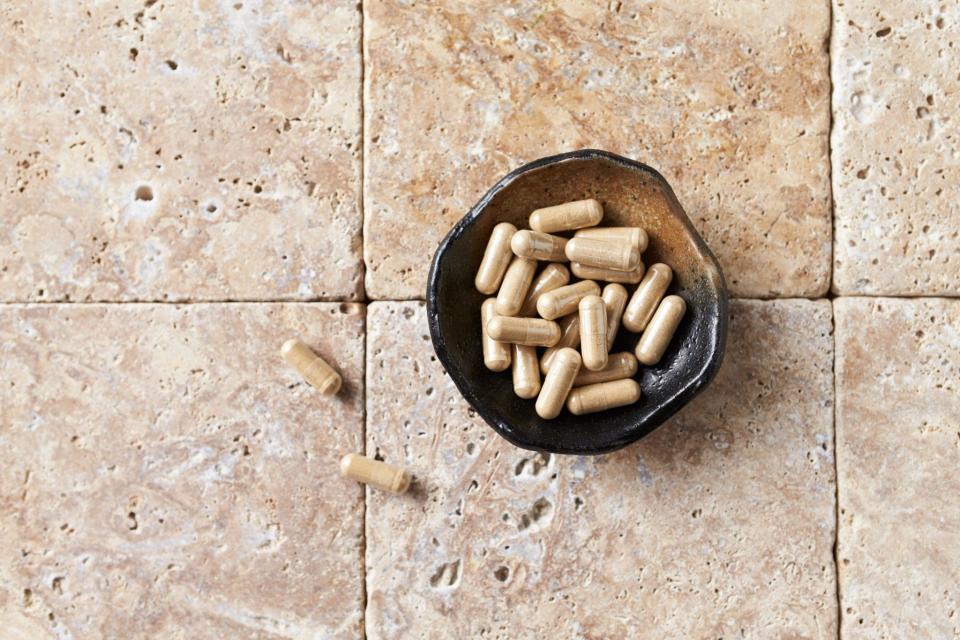4 proven health benefits of ashwagandha

What do Gwyneth Paltrow, Jennifer Lopez, and Oprah Winfrey have in common? In addition to their celebrity status, they’re all reportedly fans of ashwagandha.
Ashwagandha is an herb that has been used for millennia for a wide range of health benefits in India’s traditional Ayurvedic system of medicine.
Paltrow includes ashwagandha in her morning smoothie, Lopez takes the herb in gummy form every day, and Oprah sips a golden latte that contains ashwagandha on a daily basis.
But it’s not just for celebrities. Also known as “Indian winter cherry” or “Indian ginseng,” ashwagandha has been growing in popularity in the U.S. in recent years, as interest in Eastern medicine has increased.
“I’ve recommended ashwagandha to thousands of patients over the years,” says Dr. Akil Palanisamy, who practices integrative medicine in Sacramento, CA, and is the author of The Tiger Protocol.
Ashwagandha is an adaptogen, which is an herb or plant that helps the body respond to stress and also supports overall health.
Benefits of Ashwagandha
While there are many benefits of taking the herb, Akil says that there are four main ones:
1. Lowers stress
Adaptogens are known for their calming effects. Ashwagandha accomplishes this by lowering cortisol levels. Cortisol is the hormone that adrenal glands produce in response to stress. When these levels go down, we experience less stress.
One study showed that participants who took 250 or 600 mg of Ashwagandha extract for eight weeks had a significant decrease in perceived stress, reduced cortisol levels, and an improvement in sleep quality, compared with the group that took a placebo.
2. Helps alleviate anxiety
When your cortisol levels are elevated, you can also become anxious. In a 2019 study, participants who took 240 mg of ashwagandha extract daily for 60 days had significant reductions in their anxiety levels compared with those who received a placebo.
3. May aid sleep
Many people who struggle with getting enough shuteye turn to ashwagandha to get a better night’s sleep.
Research has suggested that the compound triethylene glycol, which naturally occurs in the herb, may lead to sleepiness.
In a review of five studies, participants who took ashwagandha extract showed a significant improvement in their overall sleep. Results were highest for participants who had been diagnosed with insomnia. In addition, study participants who took ashwagandha extract also had increased mental alertness when they woke up.
Some experts don't think ashwagandha helps with sleep, but rather helps lessen anxiety, which may facilitate better sleep.
One 2019 study found that a twice-daily dose of ashwagandha led to a reduction in anxiety and improved sleep. Another study of just 50 adults found that taking ashwagandha every day for 12 weeks improved sleep.
4. Boosts male fertility
Studies have shown that ashwagandha can increase testosterone levels and improve fertility in people assigned male at birth. According to a 2019 study, it works by increasing the production of sex hormones, including luteinizing hormone, which signals the testes to produce testosterone. In addition, a study showed that ashwagandha increases DHEA-S, a steroid hormone that converts estrogen into testosterone.
The result? A review of four clinical trials showed that ashwagandha treatment significantly improved sperm concentration and movement and increased semen volume.
Other benefits
Akil notes that some studies show that ashwagandha improves mental clarity, attention, and cognitive function in various ages of adults from college students to older adults with Alzheimer’s and Parkinson’s disease. Other studies have also shown that ashwagandha helps improve measures of physical performance in athletes.
How to take ashwagandha
There are many ways to take ashwagandha—in powder and gummy form and food and beverages made with it. You can also take it as a supplement.
Akil suggests looking for a formulation that contains at least 2% -5% withanolides, which are the active compounds in ashwagandha. He typically recommends a dose of 600 total milligrams each day, taken in two separate doses of 300 milligrams each.
He also recommends using ashwagandha for three months, taking a month off, and then going back on it again. This helps keep it more effective over time and keeps you more aware of any side effects, he says.
When considering an ashwagandha supplement, “it's best to look for a product that has been third-party tested,” says Dr. Yufang Lin, an integrated medicine specialist at the Cleveland Clinic. This way you can be assured the products meet quality and purity standards. She recommends looking for products tested by ConsumerLab.com, U.S. Pharmacopeia (USP), and/or the National Sanitation Foundation (NSF).
Negative interactions or side effects
Before trying any new herbal remedy, check with your doctor.
“Ashwagandha is a very gentle herb, but occasional side effects include stomach upset, nausea, or diarrhea,” says Lin.
Pregnant women should avoid ashwagandha, says Lin, because it can contribute to uterine contraction.
“Ashwagandha can also increase thyroid hormones,” says Lin. This can help people who have an underactive thyroid or contribute to hyperthyroidism if your thyroid is borderline hyperactive. It may also negatively interact with prescription thyroid medication. Ask your doctor if ashwagandha may interfere with any prescription drugs you are taking.
This story was originally featured on Fortune.com

 Yahoo Finance
Yahoo Finance 